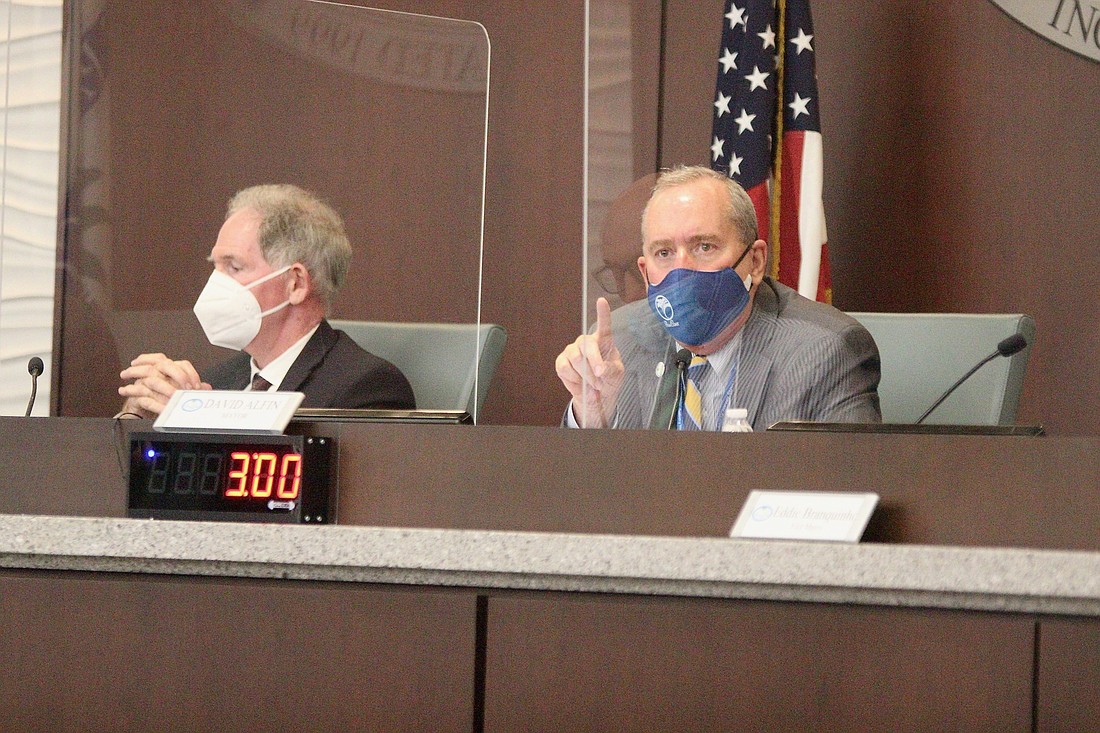- January 2, 2025
-
-
Loading

Loading

With the deadline to set a property tax rate looming, Palm Coast's council members are still divided on what that rate should be: Councilman Ed Danko wants the city to set the rate at the amount that would bring in the same amount of tax money as last year — called the rollback rate — while other council members favor a less dramatic rate reduction.
But they were able to come together Sept. 7 on a decision to fund all 10 new Sheriff's Office deputy positions requested by Sheriff Rick Staly, and asked the city's financial services department to look at how much the millage rate could be reduced if the city uses some of its reserve money to pay for expenses.
They'll meet again at 5:30 p.m. on Thursday, Sept. 9, and will be tasked with voting on the millage rate. A final budget hearing will follow at 5:30 p.m. on Sept. 22.
Holding the property tax rate steady at the current $4.6989 per $1,000 of taxable value would bring in an estimated $2.8 million more in tax dollars for the city in the coming year, and mean that the typical property owner would pay more, because property value have risen — amounting to a defacto tax increase.
The conversation between two councilmen — Eddie Branquinho, who favored holding the rate steady, and Danko, who prefers the rollback — became contentious enough that City Attorney Bill Reischmann intervened, saying the council members were breaking the city's own rules of decorum by interrupting on another, addressing each other directly rather than through the mayor, and attacking one another's motives.
"Let’s begin by picking the items that we have some agreement or consensus on," Mayor David Alfin said after the attorney's remarks. He noted that the council needed to give instructions to its finance department.
Danko had suggested that the city eliminate all planned hires for the coming year, plus merit raises for current staff. Councilman Victor Barbosa said he thought it would be a mistake to cut the planned new positions, given how quickly the city's growing.
"We need these people," he said of the proposed hirings.
And staff members, he said, need those raises, especially the ones at the bottom of the pay scale who may only be bringing home $1,500 or so a month — pay that's hard to budget on, he noted.
Alfin asked if all councilmen were in favor of funding all 10 requested deputy positions. They were.
He asked if there was consensus to reduce the millage rate. There was not. Danko wanted the rollback, Alfin favored a "modest" reduction that wouldn't be as low as the rollback, and Branquinho and Councilman Nick Klufas wanted to hold the current rate steady.
Alfin challenged Branquinho and Klufas: Why not use the city's reserves to pay for expenses, and reduce the property tax rate? he asked.
Klufas said he'd be OK with that. "It’s six of one and half dozen of the other," he said. He said that for the typical homesteaded property owner, the difference between rollback and the current rate would only be about $15.
Branquinho thought the city should maintain its reserves in case the money is needed to deal with a disaster such as a hurricane.
"I appreciate the fiscal conservancy," Alfin replied. " ... There must be some point in time at which you harvest the fruits of your labor, to some extent."
The reserves are currently 27.4% of the city's general fund, while the city's guidelines suggest 10% to 20%.
Danko said his fellow council members were ignoring the effect that holding the rate steady would have on people who own rental property and don't have the protections afforded to homesteaded property owners.
"They’re going to get the full brunt of the tax increase; they’re going to pass it on to their renters," he said. "... Our folks may lose their property. We’re not even considering that aspect of it."
Alfin said the city is in an ideal position to use some of its reserves to fund public safety, and that he'd like to reduce the millage rate modestly.
"Financially, this appears to be the best possible moment to do that," he said. "We don’t know what might happen in the future. We do know that growth is coming — a lot of growth is coming."
Danko had suggested that the city save money by reconsidering its decision to fund the creation of a regional racquet center. Alfin was open to that possibility, asking Reischmann if the city would be breaking already-executed contracts with design or construction firms if it did so.
Reischmann didn't know if those contracts had already been executed. But he but confirmed that the city could potentially opt to absorb the expense of, for instance, reimbursing a contractor for already-completed work or already-purchased supplies.
The council directed city staff to come back to the council with information on how the millage rate could be adjusted if the city dips into its reserves. The next budget hearing is Sept. 9.